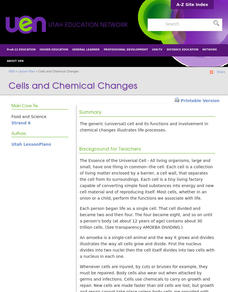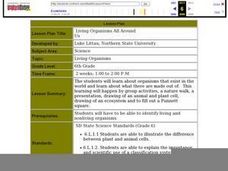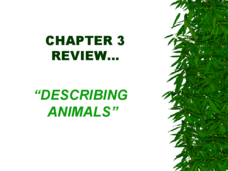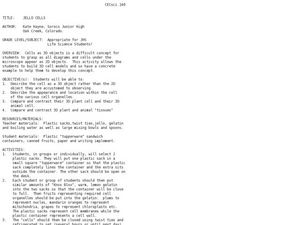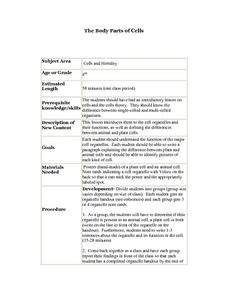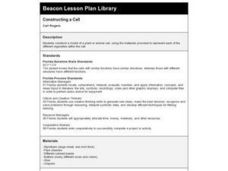The Science Spot
Cells & Organelles
Familiarize young biologists with the inner workings of eukaryotic cells with this vocabulary worksheet. By cutting out and matching a series of definitions and memorization tips to the organelles listed in the provided table, students...
Gallantsbiocorner.com
Cell Organelles
Young scientists take a trip into the microscopic world of cellular biology with this practice exercise. Given pictures of different organelles, students must correctly identify specific parts of each cellular structure to demonstrate...
Gallantsbiocorner.com
Cell Membrane & Transport
Young scientists demonstrate their understanding of cell transport on this comprehensive worksheet. Focusing on cellular structure and the different processes that allow materials to move into, out of, and throughout animal cells, this...
Curated OER
The Good and Bad Bacteria
Students are able to name one kind of harmful bacteria and why it hurts us and also name one kind of helpful bacteria and how we use it. They describe the process of growing bacterial cultures in a lab. Students create a reasonable...
Curated OER
Cells: A First-Hand View
In the first of two activities, your charges prepare wet mount slides of cork and bean sprout cells in imitation of Robert Hooke's historical investigation. An excerpt from his notes is included. Then, investigators compare animal cells...
Curated OER
Cells and Chemical Changes
The billions of cells that make up all living things are the focus of this resource. Understanding the differences between the cells that make up plants and animals is an important distinction; it is covered here quite-well. Some...
Curated OER
Living Organisms All Around Us
Sixth graders study organisms that exist in the world and what they are made up of. They participate in a nature walk, a presentation, a drawing of an animal and plant cell, draw a ecosystem, and fill out a Punnett square.
Curated OER
Animal and Plant Cell Journaling Activity
Jump into the classification of animal and plants cells, through this inviting lesson comparing Elodea leaves and Epithelial cells. Middle school learners will create wet mounts, write journal entries that compare specimens, and finally...
Curated OER
3-D Cell Model
Life science laureates choose a plant or animal cell to construct a model of as an at-home project. This handout provides guidelines, suggested materials, and a grading rubric for their reference. A full-page letter to parents is also...
Curated OER
Animal Cell Diagram
In this animal cell diagram worksheet, learners are to draw a cell in the blank space and label it using words in the word bank. No information is given about what the cell would look like.
Curated OER
Describing Animals
While a short review of animals and their classifications, this could be useful when discussing this topic in the classroom. There is a list of questions at the end to help review the main ideas. Reptiles, amphibians, and mammals are...
Curated OER
Plant and Animal Cells
Students investigate parts of a cell. In this plant cell lesson plan, students determine the difference between plant and animal cells. Students discover that coral is an animal based on cell characteristics. Students create puppets to...
Curated OER
Plant and Animal Cells: Alike and Different?
Seventh graders create a mneumonic device and a graphic organizer about the parts of plant and animal cells. In this biology instructional activity students are introduced to the parts of the cells and then work in groups to create...
Curated OER
Bread Cells
Fifth graders examine plant and animal cells. In this plant and animal cell lesson, 5th graders define what cells are, label their parts, and describe how plant and animal cells are different. They observe cells at a number of web sites,...
Curated OER
Grade 8 Science written test
For this science worksheet, 8th graders complete multiple choice questions on plant and animal cells, organisms, planets, and more. Students complete 70 questions.
Curated OER
Jello Cells
Students create a three dimensional model of a cell. In this cellular structure lesson, students use gelatin, plastic bags, plastic containers, and fruit to construct a model of a cell. They compare the cells structures and stack them to...
Curated OER
Cell Structure and Function
In this cell worksheet, students chart the function of various cell structures. Students list the organization of a multicellular organism and illustrate plant and animal cells.
Curated OER
The Virtual Electron Microscope
Students explore the world of the very small using a Flash plug-in Virtual Electron Microscope. They complete and discuss an activity in which unknown samples are placed under the computer simulated microscope to determine where the...
Curated OER
The Body Part of Cells
Eighth graders are introduced to cell organelles and their functions and the they define the differences between animal and plant cells. They write a paragraph explaining the difference between plant and animal cells and students...
Curated OER
The Cell as a System
Students review cell structures and investigate how the components of a cell operate as a system. They compare a plant and animal cell and then make a model of a cell. Students begin to understand the cell as a system by exploring a...
Curated OER
Cell Observation Exercise
Students take measurements of the distance between the objective and the slide when in focus with each objective. They determine the diameter of the field of view at each power in order to determine the size of the cells being observed.
Curated OER
Cell-O
Students create model cells using gelatin, toothpicks, and various fruits to represent organelles. Then, students observe their models and complete a Venn Diagram comparing and contrasting plant and animal cells.
Curated OER
Constructing a Cell
Third graders, in groups, make a model of a plant or animal cells and represent each of the organelles in the cell.
Curated OER
Cross-Section of an Animal Cell
A scanned copy of a diagram of the animal cell is what you will find on this worksheet. Learners label organelles on the lines provided. Unfortunately, the figure and font are somewhat fuzzy.







